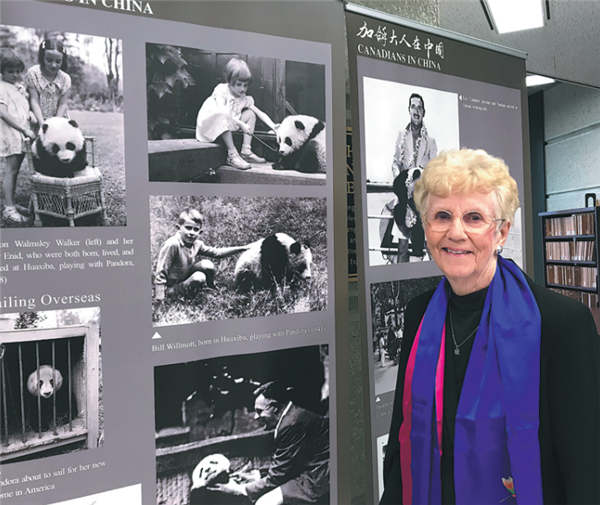 |
|
Marion Walmsley Walker stands by the photo showing her playing with a baby giant panda when she and her family lived in Huaxiba, Chengdu, in 1938. [Photo by Na Li/China Daily] |
West China Hospital
"Different groups of specialists got involved in the West China Hospital founded by my grandfather and father, making the hospital quite large," said Doctor Robert Kilborn, the eldest grandson of Doctor O. L. Kilborn, who was born in Emei, Sichuan province, in 1923 and finished junior middle school at the Canadian School and returned to Canada for further education in 1941.
"It included three departments of Western medicine, dentistry and pharmacy. I have to give them a lot of credit for that. They carried on as missionaries to build a Chinese university. He left a legacy behind of a Chinese managed university, Chinese principles, Chinese professors and Chinese self-contained."
The Kilborn Memorial Visiting Professorship Endowment Fund was established by Robert Kilborn to build a continuing relationship between Canadian doctors and the West China Centre of Medical Sciences.
"Sichuan is my home," Kilborn said. "I was born there. I hope the fund can be a start to improve the cooperation between the two universities in medical research and exchange. The Chinese visiting professors can come to Canada back and forth. In reverse, we can choose Canadian students to go to China for research. This has been my dream and goal."
The Kilborn family is among about 500 Canadians who set sail into the uncharted waters of late 19th century China, which was experiencing social unrest at the time.
These missionaries witnessed history unfold, including the end of the last Qing Dynasty (1644-1911), the Japanese invasion in the early 1930s and the subsequent civil war and eventually the birth of the People's Republic in 1949.
The doctors trained by the missionaries became the backbone of a modern medical system in the country in the post-1949 era, said Karen Minden, a University of Manitoba professor who focuses on the missionaries in China between 1892 and 1951 in her book Bamboo Stone: The Evolution of a Chinese Medical Elite.
The Endicotts are another family who lived in Sichuan for three generations. James Gareth Endicott, who was widely known by his Chinese name Wen Youzhang, was born in Sichuan of Canadian missionary parents in 1898. After serving with the Canadian army in France and graduating from the University of Toronto he returned to China and settled in Chongqing in 1925, where he soon became fluent in Chinese.
He worked in Chongqing from 1925 to 1940 and made great contributions during the War of Resistance Against Japanese Aggression (1931-45).
In Canada he became chairman of the Canadian Peace Congress and vice-chair of the World Peace Council. During the Cold War and for more than 40 years he advocated understanding and friendship with the new revolutionary China. But that advocacy led to public controversy with his church and the Canadian government, which at one time considered putting him on trial for treason.
Before he died in 1993 the city of Toronto and York University recognized him as one of Canada's prophetic voices in coming to terms with the march of history in Asia and for promoting the possibility of peaceful coexistence between differing social systems.
Endicott was also honored by the Chinese government with the Peoples' Friendship Ambassador Medal, one of the highest awards given to foreigners, for his consistent support for the Chinese people's revolution and his dedication to the international peace movement.
On his death, Endicott wanted his ashes shared with his parents in Toronto and spread in the waters of the Dadu River at his birthplace, which witnessed the historic milestones of "the Long March", "the people's communes" and the "heroic struggles of the Chinese people".
Stephen Endicott, James' son, was born in Shanghai and grew up in China. He followed in his father's footsteps to devote his life to Sino-Canadian friendship and promote the understanding of China. As a senior scholar at York University he has written several books, including a biography of his father, James G. Endicott: Rebel Out of China.